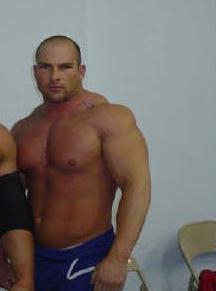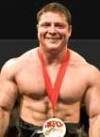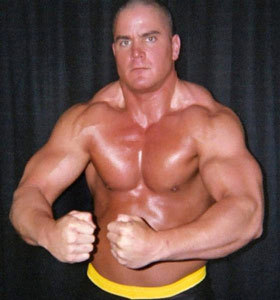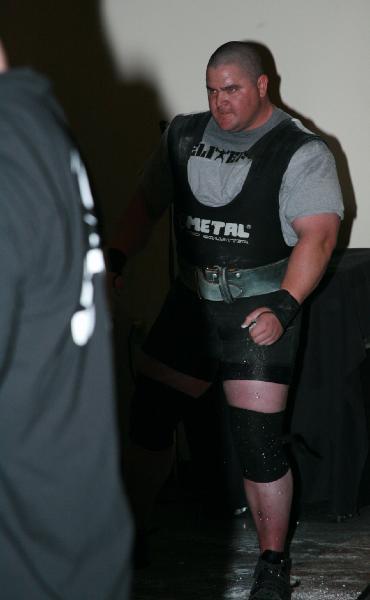I’ve noticed that most power lifters that hoist big weights usually aren’t ripped and in great shape. clarification- I"M NOT SAYING THEY AREN’T GREAT ATHLETES. Their body fat is usually fairly high. I’ve also heard bb’s say that they can lift more when they have higher bodyfat. Why is that? Is this a myth? or does fat serve a role with strength gains. Not trying to start a big debate, just curious.
I don’t know but I agree. As soon as my abs disappear my numbers go up. I love being bloated and strong. Ladies don’t like it.
The standard answers are:
-
There is no need for powerlifters to be ripped. They’re not going to step on a platform and show off their bodies. They simply aren’t concerned with being ripped.
-
Powerlifting generally focuses on lower reps with higher weight, at least for the main exercises. This type of lifting is conducive to getting big and strong, not ripped and in great shape.
-
Leverages. A bigger gut equates to a bigger squat and a bigger bench. For squat, the gut acts as a larger cushion and can provide support in the hole. For bench, it decreases the range of motion, and hence, increases the amount of weight that one can bench press. For deadlift, it usually just gets in the way, though.
As Matt Rhodes says “Weight moves weight.” The more you weigh, the more you can lift. I’m sure they’d love to be 360 pounds of jacked muscle, but it’s easier to reach that weight by gaining a bit of fat along with the muscle.
- Not all powerlifters have that high of bodyfat! In fact, in pretty much any class besides 308 or SHW, the top guys are decently ripped.
Check out Sam Byrd:

Or Matt K:


Or Mark Bell:
http://www.elitefts.com/images/PICTURES/mark-bell/mark1.jpg
Or, heck, check out Chris Mason. Not ripped, but not even close to pudgy:
- I also have a feeling (though completely unsubstantiated by any research) that the more you weigh, the more your body has what it needs to produce strength. If you’re ripped to the bone, most likely, you’re on a restricted diet and not giving your body the fuel it needs.
[quote]Bergman wrote:
The standard answers are:
-
There is no need for powerlifters to be ripped. They’re not going to step on a platform and show off their bodies. They simply aren’t concerned with being ripped.
-
Powerlifting generally focuses on lower reps with higher weight, at least for the main exercises. This type of lifting is conducive to getting big and strong, not ripped and in great shape.
-
Leverages. A bigger gut equates to a bigger squat and a bigger bench. For squat, the gut acts as a larger cushion and can provide support in the hole. For bench, it decreases the range of motion, and hence, increases the amount of weight that one can bench press. For deadlift, it usually just gets in the way, though.
As Matt Rhodes says “Weight moves weight.” The more you weigh, the more you can lift. I’m sure they’d love to be 360 pounds of jacked muscle, but it’s easier to reach that weight by gaining a bit of fat along with the muscle.
- Not all powerlifters have that high of bodyfat! In fact, in pretty much any class besides 308 or SHW, the top guys are decently ripped.
Check out Sam Byrd:

Or Matt K:


Or Mark Bell:
http://www.elitefts.com/images/PICTURES/mark-bell/mark1.jpg
Or, heck, check out Chris Mason. Not ripped, but not even close to pudgy:
- I also have a feeling (though completely unsubstantiated by any research) that the more you weigh, the more your body has what it needs to produce strength. If you’re ripped to the bone, most likely, you’re on a restricted diet and not giving your body the fuel it needs.[/quote]
makes sense…thanks for your information, it helped clear things
up.
[quote]Bergman wrote:
The standard answers are:
-
There is no need for powerlifters to be ripped. They’re not going to step on a platform and show off their bodies. They simply aren’t concerned with being ripped.
-
Powerlifting generally focuses on lower reps with higher weight, at least for the main exercises. This type of lifting is conducive to getting big and strong, not ripped and in great shape.
-
Leverages. A bigger gut equates to a bigger squat and a bigger bench. For squat, the gut acts as a larger cushion and can provide support in the hole. For bench, it decreases the range of motion, and hence, increases the amount of weight that one can bench press. For deadlift, it usually just gets in the way, though.
As Matt Rhodes says “Weight moves weight.” The more you weigh, the more you can lift. I’m sure they’d love to be 360 pounds of jacked muscle, but it’s easier to reach that weight by gaining a bit of fat along with the muscle.
- Not all powerlifters have that high of bodyfat! In fact, in pretty much any class besides 308 or SHW, the top guys are decently ripped.
Check out Sam Byrd:

Or Matt K:


Or Mark Bell:
http://www.elitefts.com/images/PICTURES/mark-bell/mark1.jpg
Or, heck, check out Chris Mason. Not ripped, but not even close to pudgy:
- I also have a feeling (though completely unsubstantiated by any research) that the more you weigh, the more your body has what it needs to produce strength. If you’re ripped to the bone, most likely, you’re on a restricted diet and not giving your body the fuel it needs.[/quote]
Best. Post. There is nothing to add to that.
If your goal is to truly reach the limits of what your body can achieve in terms of overall muscle mass, worrying about how lean you are instead of how much muscle and strength you are gaining will decrease progress.
A. They are obviously giving their body ample fuel.
B. Leverage.
The body also has some safety mechanisms to preserve energy should it reach a certain state of composition/deprivation. ( I am not suggesting starvation scenario comparisons but it is similar based on how the athlete�??s body �??understands and adapts�?? to the change of nutrient intake, weight loss, et. all.) This level differs for everyone and force production can vary widely when a person has trained to be hyper-efficient (high level endurance athletes) at a particular activity. Maximum force production will vary based on the organism�??s ability to resist the body’s natural defense and the efficiency the athlete has achieved at the activity.
For example. Elite sprinters who, usually, are lean and very strong (relative to there competitors NOT professional power lifters or bodybuilders) are also hyper-efficient at a very specific type of optimum force production through a familiar pattern muscular sequencing.
This also can help shed some light on the BULK/CUT mentality of the bodybuilding community. While it can be taken to a detrimental level, the general premise of allowing the body excess fuel to �??turn off�?? the protective �??energy safety catches�?? inside the body can help add muscle through traditional resistance exercise principals. The additional fuel, while providing the nutrients to make muscles grow also keeps the body from any conservatory measures. To a point. The battle for growth occurs when the body adapts to exercise volumes or patterns and becomes more efficient. Once it does that energy conservation is not achieved as a safety mechanism but as an �??efficient adaptation to stress.�??
Power lifters make sure this strength sapping protection mechanisms do not kick in as it is contrary to their goal. In addition, the additional bulk helps the athlete because it alters bar travel patterns and distances in order to move the most weight.
Fat can help - it all depends are your goal. A little fat now can be burned off later.
The simple answer is it is hard to get stronger when you are on a diet.
And lets not forget that seems like mosty here are talking about heavyweight lifters… a guy who weights 75kg and is fat wont be able to be much strong compared to a guy who is 75kg lean just because he doesnt have enogh muscle in his frame.
I would say for a powerlifter 90kg of lean mass+ 20kg of fat can be better than 90kg of lean mass+ 10kg of fat(the fat makes the guy heavier), but i´m sure that of 90kg lean mass+ 20kg of fat isnt better than 100kg of lean mass+ 10kg of fat (the guys weight the same, so more fat = less muscle). Just my 2cents.
Thanks Sagat - I did fail to mention that weight class considerations need to be taken into account.
[quote]yogaroots wrote:
Check out Sam Byrd:
http://i.b5z.net/i/u/230085/i/Sam_Byrd_Powerlifting_Powerlifter_2.jpg [/quote]
Gonna throw out a side comment that that dude appears to have misplaced his neck, that is some amazing development.
mark bell is uber jacked these days!

[quote]Frank.S wrote:
mark bell is uber jacked these days![/quote]
they always do when they strip away the fat.
[quote]Professor X wrote:
Bergman wrote:
The standard answers are:
-
There is no need for powerlifters to be ripped. They’re not going to step on a platform and show off their bodies. They simply aren’t concerned with being ripped.
-
Powerlifting generally focuses on lower reps with higher weight, at least for the main exercises. This type of lifting is conducive to getting big and strong, not ripped and in great shape.
-
Leverages. A bigger gut equates to a bigger squat and a bigger bench. For squat, the gut acts as a larger cushion and can provide support in the hole. For bench, it decreases the range of motion, and hence, increases the amount of weight that one can bench press. For deadlift, it usually just gets in the way, though.
As Matt Rhodes says “Weight moves weight.” The more you weigh, the more you can lift. I’m sure they’d love to be 360 pounds of jacked muscle, but it’s easier to reach that weight by gaining a bit of fat along with the muscle.
- Not all powerlifters have that high of bodyfat! In fact, in pretty much any class besides 308 or SHW, the top guys are decently ripped.
Check out Sam Byrd:

Or Matt K:


Or Mark Bell:
http://www.elitefts.com/images/PICTURES/mark-bell/mark1.jpg
Or, heck, check out Chris Mason. Not ripped, but not even close to pudgy:
- I also have a feeling (though completely unsubstantiated by any research) that the more you weigh, the more your body has what it needs to produce strength. If you’re ripped to the bone, most likely, you’re on a restricted diet and not giving your body the fuel it needs.
Best. Post. There is nothing to add to that.
If your goal is to truly reach the limits of what your body can achieve in terms of overall muscle mass, worrying about how lean you are instead of how much muscle and strength you are gaining will decrease progress.[/quote]
When gaining weight your body is put in an anabolic phase that causes you to get stronger and bigger. Some studies demonstrate this increase in strength for even those who aren’t training. However, for a BB, the down side is that you loose a lot of strength and mass when you cut. Not all, but a lot.
[quote]Bergman wrote:
- I also have a feeling (though completely unsubstantiated by any research) that the more you weigh, the more your body has what it needs to produce strength. If you’re ripped to the bone, most likely, you’re on a restricted diet and not giving your body the fuel it needs.[/quote]
I’ve feel there is something too this as well. Something maybe about how the body reacts when BF levels are low (like a flight or fight stress?).
Or maybe something more simple: the guy that eats a lot of the time has plenty of nutrients available at all times that he (may) need them…a guy being strict with his diet may miss an anabolic window when he need the grub.
I also wonder about this magic 10% number that gets thrown around…I’ve been stronger at 13% BF than 9% (caliper test). It may be that being ecto-ish I can/need to be higher to grow.
Thanks for the responses. They all make sense. I just never see a ripped, lean 5 per center pushing mammoth weights and these responses explain why. Guess fat is our friend.
http://www.T-Nation.com/tmagnum/readTopic.do?id=2015814&pageNo=1
This thread contains the following post by T-Nation member 2274:
So it seems it has to do with neural efficiency, too.
